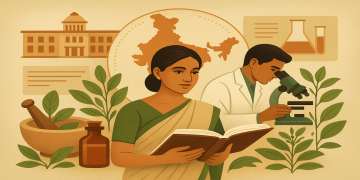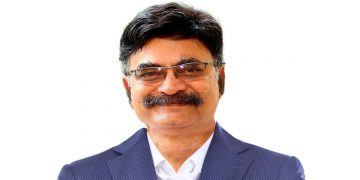In this insightful interview, Dr. Deependra Kumar Jha, Vice Chancellor, Manav Rachna University (MRU), Faridabad talks about the critical role of industry-academia collaboration, a subject of increasing relevance in today’s growing higher education landscape. Prof. Jha shares his approach to aligning academic curriculums with industry needs, discusses the university’s robust support for research, and highlights how emerging technologies like Generative AI are reshaping education. He also goes into global academic partnerships, the future of technical education, and the role of renewable energy, offering a comprehensive view of MRU’s vision for progressive education. Let’s dive in!
Q. As a strong advocate for industry-academia collaboration, how has your professional experience shaped your approach to aligning academic curriculums with industry requirements?
My extensive professional experience, particularly during my tenure at Larsen & Toubro and various academic institutions, has provided me with a deep understanding of both industry expectations and academic structures. I firmly believe that the gap between academia and industry can only be bridged through active collaboration and continuous dialogue. My approach to aligning academic curriculums with industry requirements involves introducing a curriculum that is both dynamic and responsive to current industry trends. This includes incorporating internships, live industry projects, and collaborations with leading companies that provide students with hands-on experience. At Manav Rachna University, we aim to develop partnerships that allow industry experts to contribute to curriculum design and offer students the opportunity to work on real-world problems. Also, we try to integrate emerging technologies into education, ensuring students are well-prepared for the rapidly evolving workforce and equipped with both theoretical knowledge and practical skills.

Q. How does Manav Rachna University support research initiatives for both faculty and students?
Manav Rachna University (MRU) offers a robust support system for research, aimed at fostering academic excellence and global collaboration. The university enables faculty and graduate students to engage in diverse research activities by funding their visits to research sites, where they can collect data and collaborate with other scholars. MRU also organizes dissertation workshops to help doctoral students in their research journeys, offering them guidance and the tools necessary to complete their research projects successfully. Also, the university provides financial support for workshops and colloquia at key research sites, promoting knowledge exchange and academic growth. International collaborations are a cornerstone of MRU’s research ecosystem, with global partnerships enriching the research culture and enabling students and faculty to work alongside international experts. These initiatives reflect MRU’s commitment to advancing knowledge across disciplines and enhancing the research capabilities of both its students and faculty.
The University Instrumentation Centre (UIC) at MRU provides advanced instrumentation facilities to support research across various scientific fields such as chemical, material, and nanosciences. It extends its services to both internal and external researchers, including industries, promoting cutting-edge research and innovation. The faculty members are ranked among the top 2% of global researchers by Stanford University which highlights their steadfast dedication to innovation and research excellence.

Q. What facilities does Manav Rachna University provide to promote technological research?
Manav Rachna University has a state-of-the-art research infrastructure, featuring advanced laboratories and equipment that facilitate cutting-edge research across various disciplines. These resources empower students to immerse themselves in research, explore the latest technological advancements and contribute to meaningful innovations. The university’s focus on creating an ideal research environment allows students to delve deeply into their areas of interest, whether it’s in engineering, sciences, or emerging fields. With access to sophisticated tools and research facilities, students can experiment with new technologies and work on projects that push the boundaries of conventional knowledge. Moreover, MRU’s commitment to staying at the forefront of technological advancements helps its students stay well-equipped to meet the challenges of the future. This infrastructure plays a crucial role in nurturing the next generation of innovators and leaders in technology and research.

Q. How does Manav Rachna University foster global academic partnerships, and what impact do these have on students?
Manav Rachna University has cultivated a vast network of global academic partnerships, collaborating with foreign universities and institutions to enhance research and learning. These partnerships promote diversity, allowing students and faculty to exchange ideas with peers from different cultural and academic backgrounds. Through international webinars, expert lecture series, and joint conferences, MRU provides a platform for researchers to present their findings and engage in global discussions. These interactions encourage students to think globally and broaden their research perspectives. Also, MRU faculty members frequently collaborate with international scholars on projects, including patent-related endeavours, further emphasizing the university’s commitment to producing research with a global impact. Students benefit immensely from these collaborations, gaining the opportunity to explore research initiatives abroad, participate in ongoing experiments, and work with international experts. This hands-on learning experience enhances their academic and professional development, preparing them for a globalized job market.
Q. What role do international collaborations play in the research environment at Manav Rachna University?
International collaborations are a vital component of Manav Rachna University’s research ecosystem, fostering a globally inclusive and enriching environment. The university’s partnerships with foreign universities and institutions provide a platform for knowledge exchange, joint research projects, and collaborative innovations. These collaborations manifest in various forms, including international webinars, conferences, and expert lecture series, where researchers from different countries share their findings and insights. Faculty members at MRU play an active role in these collaborations, contributing to global knowledge by authoring research papers, serving as technical reviewers for international journals, and partnering with international experts on patent-related projects. Through these efforts, we not only try to enhance the university’s research output but also provide students with valuable opportunities to participate in international research initiatives. By working on global projects, MRU students gain exposure to different research methodologies and perspectives, equipping them with the skills and knowledge needed to contribute to impactful, cross-border innovations.

Q. How do you envision the future of education in technical fields, particularly in areas like emerging technologies and renewable energy, given your research and expertise?
The future of education in technical fields lies in embracing emerging technologies and sustainable solutions like renewable energy. Research in areas such as smart grids, power system reliability, and renewable energy has shown that these fields are at the core of future technological advancements. Educational institutions must adopt a forward-thinking approach, where students are trained in cutting-edge technologies like AI, machine learning, and renewable energy systems. At Manav Rachna University, we look at creating a learning environment that encourages innovation, critical thinking, and research-driven learning. By integrating advanced laboratories, research centres, and industry collaborations, we try to prepare students to address the challenges of a sustainable future. It is crucial that students not only learn about emerging technologies but also contribute to advancements through research and innovation, making them key players in the global shift towards a more sustainable and technologically advanced society.





























































